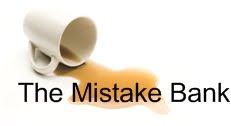I've been thinking about Theodore Roosevelt recently. Our summer vacation included visiting a bunch of national parks, all of which seemed to have had Roosevelt's hand in their creation. I also have seen this quote from Roosevelt in several places:
“The only man who makes no mistakes is the man who never does anything.”
Which led me to wonder if there were some good Roosevelt mistake stories out there. Here's one I found in a book called "Theodore Roosevelt on Leadership: Lessons from the Bully Pulpit," by James L. Strock. Here it is:
One of Roosevelt's [mistakes], which seems almost comic today, involved the early twentieth-century movement for simplified spelling. Curiously for one so highly educated and said to be gifted with a photographic memory, TR was an atrocious speller. As president he expressed sympathy with the efforts of the Spelling Reform Association to simplify and systematize spelling. In 1906 he directed that government agencies adopt more than 300 spelling changes proposed by academic experts.
Though the reforms might be defensible on the basis of logic, public reaction ranged from derision to anger. The chief justice of the Supreme Court defiantly refused to adopt the new spelling. When Roosevelt sent his annual message to Congress employing the new spellings, opponents grasped an opportunity to focus their long-simmering rage against what they considered a pattern of executive overreaching. A typical reaction was that of the Louisville Courier-Journal:
Nuthing escapes Mr. Rucevelt. No subject is to hi fr himn to takl, not to lo for him to notis. He makes tretis without the consent of the Senit. He inforces such laws as meet his approval, and fales to se those that du not soot him. He now assales the English langgwidg, constitutes himself a sort of French Academy, and will reform the spelling in a way tu suit himself.
The Baltimore Sun queries: "How will he spell his name? Will he make it 'Rusevelt' or will he get down to the fact and spell it 'Butt-in-sky"? A humorist summed up the general reaction: "This is 2 mutch."
The House of Representatives, after days of debate, unanimously rebuked the president, directing that government documents should reflect "the standard of orthography prescribed in generally accepted dictionaries of the language." TR saw the risk that the symbolic resonance of such a non-essential issue could damage his ability to lead on more significant matters. He rescinded his executive order and abandoned the cause - other than saying he would use simplified spelling in his own correspondence. [pp87-88]

